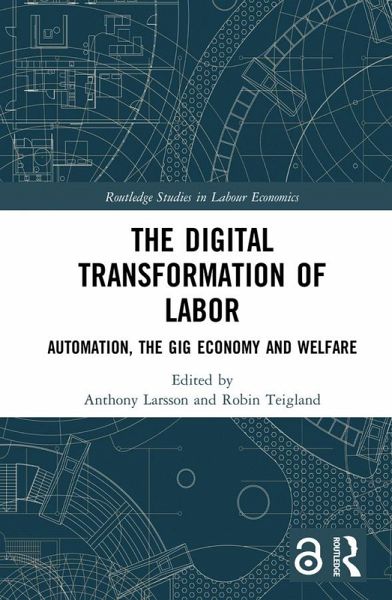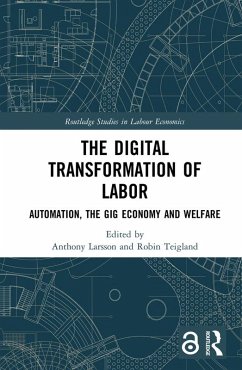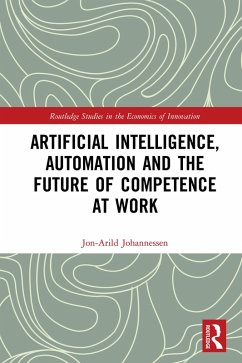
The Digital Transformation of Labor (eBook, PDF)
Automation, the Gig Economy and Welfare
Redaktion: Larsson, Anthony; Teigland, Robin

PAYBACK Punkte
0 °P sammeln!
Through a series of studies, the overarching aim of this book is to investigate if and how the digitalization/digital transformation process causes (or may cause) the autonomy of various labor functions, and its impact in creating (or stymieing) various job opportunities on the labor market. This book also seeks to illuminate what actors/groups are mostly benefited by the digitalization/digital transformation and which actors/groups that are put at risk by it.This book takes its point of departure from a 2016 OECD report that contends that the impact digitalization has on the future of labor i...
Through a series of studies, the overarching aim of this book is to investigate if and how the digitalization/digital transformation process causes (or may cause) the autonomy of various labor functions, and its impact in creating (or stymieing) various job opportunities on the labor market. This book also seeks to illuminate what actors/groups are mostly benefited by the digitalization/digital transformation and which actors/groups that are put at risk by it.
This book takes its point of departure from a 2016 OECD report that contends that the impact digitalization has on the future of labor is ambiguous, as on the one hand it is suggested that technological change is labor-saving, but on the other hand, it is suggested that digital technologies have not created new jobs on a scale that it replaces old jobs. Another 2018 OECD report indicated that digitalization and automation as such does not pose a real risk of destroying any significant number of jobs for the foreseeable future, although tasks would by and large change significantly. This would affects welfare, as most of its revenue stems from taxation, and particularly so from the taxation on labor (directly or indirectly). For this reason, this book will set out to explore how the future technological and societal advancements impact labor conditions.
The book seeks to provide an innovative, enriching and controversial take on how various aspects of the labor market can be (and are) affected the ongoing digitalization trend in a way that is not covered by extant literature. As such, this book intends to cater to a wider readership, from a general audience and students, to specialized professionals and academics wanting to gain a deeper understanding of the possible future developments of the labor market in light of an accelerating digitalization/digital transformation of society at large.
This book takes its point of departure from a 2016 OECD report that contends that the impact digitalization has on the future of labor is ambiguous, as on the one hand it is suggested that technological change is labor-saving, but on the other hand, it is suggested that digital technologies have not created new jobs on a scale that it replaces old jobs. Another 2018 OECD report indicated that digitalization and automation as such does not pose a real risk of destroying any significant number of jobs for the foreseeable future, although tasks would by and large change significantly. This would affects welfare, as most of its revenue stems from taxation, and particularly so from the taxation on labor (directly or indirectly). For this reason, this book will set out to explore how the future technological and societal advancements impact labor conditions.
The book seeks to provide an innovative, enriching and controversial take on how various aspects of the labor market can be (and are) affected the ongoing digitalization trend in a way that is not covered by extant literature. As such, this book intends to cater to a wider readership, from a general audience and students, to specialized professionals and academics wanting to gain a deeper understanding of the possible future developments of the labor market in light of an accelerating digitalization/digital transformation of society at large.
Dieser Download kann aus rechtlichen Gründen nur mit Rechnungsadresse in A, B, BG, CY, CZ, D, DK, EW, E, FIN, F, GR, HR, H, IRL, I, LT, L, LR, M, NL, PL, P, R, S, SLO, SK ausgeliefert werden.













